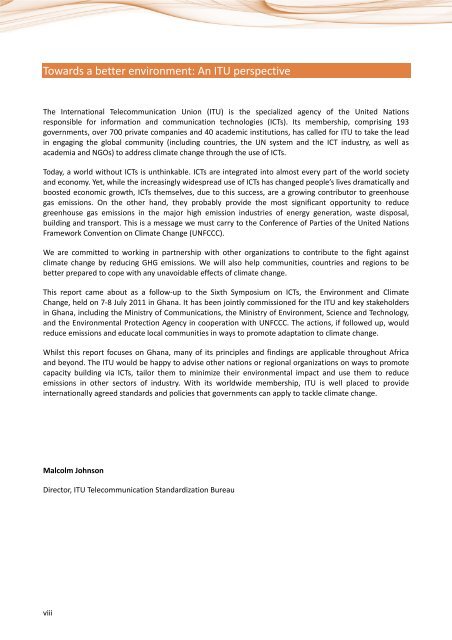Information and communication technologies (ICTs) and ... - ITU
Information and communication technologies (ICTs) and ... - ITU
Information and communication technologies (ICTs) and ... - ITU
Create successful ePaper yourself
Turn your PDF publications into a flip-book with our unique Google optimized e-Paper software.
Towards a better environment: An <strong>ITU</strong> perspective<br />
The International Tele<strong>communication</strong> Union (<strong>ITU</strong>) is the specialized agency of the United Nations<br />
responsible for information <strong>and</strong> <strong>communication</strong> <strong>technologies</strong> (<strong>ICTs</strong>). Its membership, comprising 193<br />
governments, over 700 private companies <strong>and</strong> 40 academic institutions, has called for <strong>ITU</strong> to take the lead<br />
in engaging the global community (including countries, the UN system <strong>and</strong> the ICT industry, as well as<br />
academia <strong>and</strong> NGOs) to address climate change through the use of <strong>ICTs</strong>.<br />
Today, a world without <strong>ICTs</strong> is unthinkable. <strong>ICTs</strong> are integrated into almost every part of the world society<br />
<strong>and</strong> economy. Yet, while the increasingly widespread use of <strong>ICTs</strong> has changed people’s lives dramatically <strong>and</strong><br />
boosted economic growth, <strong>ICTs</strong> themselves, due to this success, are a growing contributor to greenhouse<br />
gas emissions. On the other h<strong>and</strong>, they probably provide the most significant opportunity to reduce<br />
greenhouse gas emissions in the major high emission industries of energy generation, waste disposal,<br />
building <strong>and</strong> transport. This is a message we must carry to the Conference of Parties of the United Nations<br />
Framework Convention on Climate Change (UNFCCC).<br />
We are committed to working in partnership with other organizations to contribute to the fight against<br />
climate change by reducing GHG emissions. We will also help communities, countries <strong>and</strong> regions to be<br />
better prepared to cope with any unavoidable effects of climate change.<br />
This report came about as a follow-up to the Sixth Symposium on <strong>ICTs</strong>, the Environment <strong>and</strong> Climate<br />
Change, held on 7-8 July 2011 in Ghana. It has been jointly commissioned for the <strong>ITU</strong> <strong>and</strong> key stakeholders<br />
in Ghana, including the Ministry of Communications, the Ministry of Environment, Science <strong>and</strong> Technology,<br />
<strong>and</strong> the Environmental Protection Agency in cooperation with UNFCCC. The actions, if followed up, would<br />
reduce emissions <strong>and</strong> educate local communities in ways to promote adaptation to climate change.<br />
Whilst this report focuses on Ghana, many of its principles <strong>and</strong> findings are applicable throughout Africa<br />
<strong>and</strong> beyond. The <strong>ITU</strong> would be happy to advise other nations or regional organizations on ways to promote<br />
capacity building via <strong>ICTs</strong>, tailor them to minimize their environmental impact <strong>and</strong> use them to reduce<br />
emissions in other sectors of industry. With its worldwide membership, <strong>ITU</strong> is well placed to provide<br />
internationally agreed st<strong>and</strong>ards <strong>and</strong> policies that governments can apply to tackle climate change.<br />
Malcolm Johnson<br />
Director, <strong>ITU</strong> Tele<strong>communication</strong> St<strong>and</strong>ardization Bureau<br />
viii

















